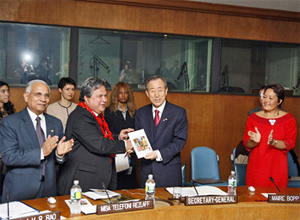A new report from an independent Commission on AIDS in Papua New Guinea and the Pacific draws global attention to the challenges of the AIDS epidemic in the region. 'Turning the Tide: An OPEN strategy for a response to AIDS in the Pacific', was presented to UN Secretary-General Ban Ki-moon on 2 December 2009 and proposes actions to improve the effectiveness of the response.
According to the report, Papua New Guinea has the majority of the region's HIV cases–over 99 per cent in 2008. It is a growing epidemic. Unless action is taken, it is estimated that the rate of HIV infection in Papua New Guinea will reach more than 5 per cent of the general population by 2012. Unprotected heterosexual sex is the main means of HIV transmission in the region. The number of HIV-positive young people is steadily increasing and young women are infected earlier than young men. However, male-to-male sex is also identified as a risk behaviour which contributes to the epidemic spread in a number of countries.
The report states that a 'one size fits all' response does not suit the diversity of Pacific nations, and outdated legislation criminalizing homosexuality and commercial sex is a major impediment in the region.
The Commission was chaired by the Honourable Misa Telefoni Retzlaff MP, Deputy Prime
Minister of Samoa. Commission members included the Honourable Dame Carol Kidu, CBE, MP, Minister of Community Development, Papua New Guinea and Professor Rob Moodie from Nossell Institute of Global Health at the University of Melbourne.
UNAIDS, the joint United Nations Programme on HIV/AIDS, has planned regional Pacific launches of the report in early 2010 to engage national leaders on the issue.
Report: Turning the Tide: An OPEN strategy for a response to AIDS in the Pacific [external website]

